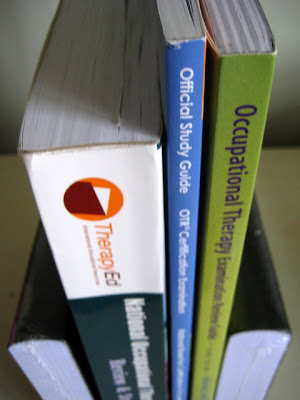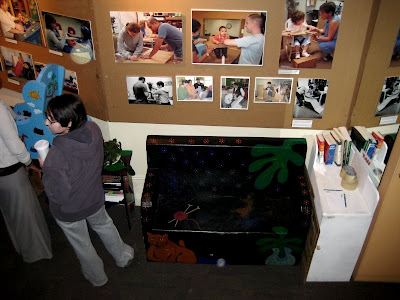Most of my colleagues working in brain injury have this credential although it is not a requirement in the field.
purposeful activity.
Saturday, September 10, 2011
CBIS
The Academy of Certified Brain Injury Specialists offer a certification for entry-level and experienced brain injury professionals. This is not limited to a specific discipline but for any "anyone who delivers services specific to brain injury."
Monday, September 5, 2011
Cognitive Rehabilitation
While in OT graduate school, I did not appreciate the impact cognitive rehabilitation had on people with brain injury. It seemed as if the focus was on physical disabilities, with a much smaller focus and introduction to the specialized niche of cognitive rehab. As such, I spent less time thinking about cognition and more of my medical-model-mind focused on kinesiology, range of motion, strengthening, stretching, physical agent modalities, and protocols.
My year in cognitive rehabilitation has taught me that my OT approach has been too two-dimensional and less holistic than I thought, that cog rehab is a transdisciplinary form of rehabilitation that has introduced me to thinking outside the box and to reducing self-limiting discipline specific walls that curtail rather than progress client treatment programs.
I highly recommend the book Cognitive Rehabilitation by Sohlberg and Mateer as a comprehensive introduction to this extraordinary specialty.
Saturday, June 26, 2010
"a new hope" in Parkinson's research
Sergey Brin’s Search for a Parkinson’s Cure
A fabulous and informative article about a hopeful direction in Parkinson's research. I'm especially interested in this as my father suffers from it. It's funny how Parkinson's is characterized by the tremors, or as father calls it, the shakes. But when you cross the border into the land of dementia, living with someone with Parkinson's is almost like living with a part-time schizophrenic. Is it the Sinemet? Is it the Mirapex? Is it worth it? My father routinely yells at "the people" in our house, jumps out of his scooter to chase them away. I wonder if the medications give him the ability to move and the curse of seeing and hearing things that are not there. It's so hard not to respond to his hallucinations. No, they're not there. No one is here. No one is tapping the phone lines. No one cut down that tree and put it back together with metal strips. People are not jumping over the fence to get into our backyard. There is no little girl in the corner. I don't see construction workers working on our house. No one is standing by the window.
I often look for old movies to distract him. Right now, he's watching The Magnificent Seven. A great distracter.
Church tomorrow. Chocolate pudding and a good book tonight.
Labels:
Parkinson's
Monday, March 29, 2010
Exam preparation
After graduating, I was faced with the difficult task of organizing all school materials for a thorough review prior to taking the NBCOT exam. Therapists suggested taking a prep course, so I googled just that and found TherapyEd NBCOT Exam Prep. I was taken aback by the price but heard really good reviews from fellow students. I enrolled, received my very thick study guide book, and began studying.

 I'm going to pick on the "official" NBCOT exam review guide for a moment. It is an extremely expensive book that does not in any way compare to the TherapyEd guide. As a matter of fact, scattered within its pages are corrections to material presented. NBCOT glued correction cards onto the pages of its official guide after being informed by third parties of the errors contained within.
I'm going to pick on the "official" NBCOT exam review guide for a moment. It is an extremely expensive book that does not in any way compare to the TherapyEd guide. As a matter of fact, scattered within its pages are corrections to material presented. NBCOT glued correction cards onto the pages of its official guide after being informed by third parties of the errors contained within.
 Finally, when you arrive at the TherapyEd course, you will receive an additional manual with excellent test-taking and study strategies that helped me pass the exam. It's pretty much a more in-depth recap of the entire course.
Finally, when you arrive at the TherapyEd course, you will receive an additional manual with excellent test-taking and study strategies that helped me pass the exam. It's pretty much a more in-depth recap of the entire course.
I must also say that I purchased the NBCOT Official OTR Study Guide for $60 from www.nbcot.org and the Occupational Therapy Examination Review Guide by Caryn R. Johnson. After taking Rita P. Fleming-Castaldy's 2 full-day classes, I hardly cracked open either one.

Here is a side-by-side view of the 3 review guides I purchased.
From left to right:
(1) TherapyEd OT Certification Exam Review & Study Guide
(2) NBCOT OTR Official Study Guide
(3) OT Exam Review Guide by Johnson.
Note that when you purchase the TherapyEd Exam Review & Study Guide separately, the cost is $85-it's included in the price of the course-, $25 more than NBCOT's review guide, yet containing MUCH more material plus a CD-ROM with 3 practice exams.
Another view.
The TherapyEd OT Review and Study Guide is extremely thorough. This book is not required at the classes, though, as the purpose of the course is not to review material but to become oriented with the NBCOT exam format and learn invaluable test-taking strategies designed to help you maximize your time during this time-limited test. The remaining time is spent answering practice questions presented in the question formats you will encounter on the test. This is designed to help discover your strengths and weaknesses in test-taking strategies and to practice what you learned.
 I'm going to pick on the "official" NBCOT exam review guide for a moment. It is an extremely expensive book that does not in any way compare to the TherapyEd guide. As a matter of fact, scattered within its pages are corrections to material presented. NBCOT glued correction cards onto the pages of its official guide after being informed by third parties of the errors contained within.
I'm going to pick on the "official" NBCOT exam review guide for a moment. It is an extremely expensive book that does not in any way compare to the TherapyEd guide. As a matter of fact, scattered within its pages are corrections to material presented. NBCOT glued correction cards onto the pages of its official guide after being informed by third parties of the errors contained within. Finally, when you arrive at the TherapyEd course, you will receive an additional manual with excellent test-taking and study strategies that helped me pass the exam. It's pretty much a more in-depth recap of the entire course.
Finally, when you arrive at the TherapyEd course, you will receive an additional manual with excellent test-taking and study strategies that helped me pass the exam. It's pretty much a more in-depth recap of the entire course.
Labels:
prep
Sunday, March 28, 2010
I'm back.
It has been a while since posting to this blog. A quick recap--I graduated and passed the NBCOT exam. I'm suffering through the long wait of licensure until I can practice at a renowned rehab center.
I intend to document my time as an entry-level therapist...when time permits!
I intend to document my time as an entry-level therapist...when time permits!
Tuesday, June 23, 2009
Wednesday, June 10, 2009
Update to my life
So a funny thing happened on my way to the in-patient ortho gym...I was assigned to the in-patient neuro/stroke team. Today is Day 3, and I'm learning a lot of stuff that can't be taught in textbooks. I've been exposed to hackers (hacking up a lung), vomit, accidental discharge of bodily fluids, and a few evil eyes.
No complaints here.
I just have a strong interest in hands, and the ortho unit which is so close (one floor above) is yet so far. lol I'm still waiting to find out if I get to rotate. If not, no biggie. Every experience is a learning opportunity.
Labels:
FWII
Tuesday, May 5, 2009
Par Fore
Alexander Lopez, JD, OTR/L, from Stony Brook University's occupational therapy program developed a golf mentoring program called Par Fore.
Perseverance
Accountability
Resiliency
Fellowship
Opportunity
Respect
Empowerment
This program was designed for at-risk adolescents living in environments that foster destructive behavior. It is designed to help them develop self-esteem, self-empowerment, productive social skills, and constructive behaviors.
Mr. Lopez was a guest speaker in my Community Practice class. His program speaks to endless possibilities OTs have when working with clients.
Labels:
community practice
Saturday, April 11, 2009
Adaptive Design, New York
Class trip! We went to Adaptive Design for the day to explore the wonderful world of cardboard and other cheap and sturdy materials. They are used to make much needed equipment such as stools, high chairs, benches, and many adaptive things for kids and adults. Here are some pictures I took during our tour. We also had the opportunity to make a booster seat out of cardboard. I haven't taken a picture of it, yet. Hopefully, it's still in the OT lab.
It's pretty amazing what can be made out of cardboard. I expected to see flimsy and ugly, brown things that wouldn't last long. After our powerpoint lecture at Adaptive Design and a quick demonstration of how they were built, my biases about cardboard ended. The strength and sturdiness is incredible. Depending on the layers and ply of cardboard, these mini pieces of furniture can hold up to 850 lbs. Everything is specially designed to meet the needs of the client. The product is primed, painted, and decorated. And it will last about 3 years.
The following photos show just a few of what can be found at Adaptive Design. I highly recommend this as a source for all professionals. They collaborate with OTs, PTs, family members, and just about anyone. They thrive on donations to keep the program afloat. If you're in the area, they're located on 313 West 36th Street, New York, NY 10018. They, also, have volunteer nights. For more information call: (212) 904-1700.





It's pretty amazing what can be made out of cardboard. I expected to see flimsy and ugly, brown things that wouldn't last long. After our powerpoint lecture at Adaptive Design and a quick demonstration of how they were built, my biases about cardboard ended. The strength and sturdiness is incredible. Depending on the layers and ply of cardboard, these mini pieces of furniture can hold up to 850 lbs. Everything is specially designed to meet the needs of the client. The product is primed, painted, and decorated. And it will last about 3 years.
The following photos show just a few of what can be found at Adaptive Design. I highly recommend this as a source for all professionals. They collaborate with OTs, PTs, family members, and just about anyone. They thrive on donations to keep the program afloat. If you're in the area, they're located on 313 West 36th Street, New York, NY 10018. They, also, have volunteer nights. For more information call: (212) 904-1700.





Labels:
adaptive technology
Abilities Expo
There's a big event in New Jersey on April 17-19 called the Abilities Expo. It's something I hope my entire class can attend. I'm going with a few classmates and hopefully some family members. This will be my first time attending, so I'll be sure to take plenty of pictures. In the meantime, check out the site to see when the expo will be in your area.
Labels:
adaptive technology
Saturday, March 7, 2009
NYC's Underground
New York City's Underground Community of Mole People
This article brings to light some of the struggles people with mental illness go through just to survive.
This article brings to light some of the struggles people with mental illness go through just to survive.
Labels:
mental health,
NYC
Sunday, March 1, 2009
a room with a view
On a non-OT note, I thought I'd share three photos taken from my Community Practice classroom. Washington Square Park under snow and in all its glory. Sometimes it's best to stop thinking for a moment and enjoy the view.


And when class is over, you get to see Beauty up close and personal.



And when class is over, you get to see Beauty up close and personal.

one of my professors
My Pediatric Perspective professor Kristie Koenig, pronounced "KAY nig". One of my favorite classes, even though I don't see myself going into pediatrics. This class (plus my little niece and nephew) are giving me the peds bug.
Kristie Koenig to receive the AOTA Roster of Fellows
Kristie Koenig to receive the AOTA Roster of Fellows
Labels:
faculty,
NYU,
pediatrics
VESID
Vocational and Educational Services for Individuals With Disabilities (VESID)
From website:
From website:
VESID offers access to a full range of services that may be needed by persons with disabilities through their lives. Through its administration of both the special education and vocational rehabilitation programs, VESID coordinates policy and services relating to:
- transition services for infants and toddlers with disabilities (ages birth to two years);
- special education services for students with disabilities (3-21);
- transition services for students with disabilities from school to adult services;
- vocational rehabilitation services for individuals with disabilities, ages 16 and older; and
- independent living services for adults with disabilities.
Labels:
education,
NYS,
pediatrics
The Transporters
The Transporters is a DVD collection that plays off of Thomas the Train to "help your child recognize emotions".
Labels:
autism,
pediatrics
Subscribe to:
Posts (Atom)






























